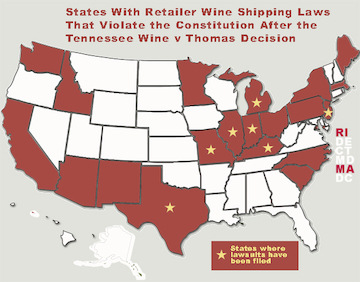Reciprocal Wine Shipping Laws Are Unconstitutional, But…Still Yet
It’s a word associated with the concept of direct to consumer wine shipments that has not been bandied about for some time. But it turns out that there is a selection of states that still require reciprocal wine shipping agreements.
It also turns out reciprocal wine shipping laws are unconstitutional.
As a reminder, “Reciprocal” wine shipping laws are those in which State #1 passes a law allowing wineries or retailers in other states to ship in so long as those other states allow shippers in State #1 to ship back to their consumers.
Recently the National Association of Wine Retailers released a map that showed which states, in the wake of the recent Tennessee Wine v Thomas Supreme Court decision, have unconstitutional wine retailer shipping laws on the books. Most of these unconstitutional laws are your run-of-the-mill protectionist, anti-competitive laws that ban out-of-state wine retailers from shipping in while allowing their own in-state retailers to ship wine to residents. However, some of these states’ retailer wine shipping laws are unconstitutional due to their reciprocal shipping provisions.
But first the unconstitutional part.
In the 2005 Granholm v Heald Supreme Court decision we read the following:
“The rule prohibiting state discrimination against interstate commerce follows also from the principle that States should not be compelled to negotiate with each other regarding favored or disfavored status for their own citizens. States do not need, and may not attempt, to negotiate with other States regarding their mutual economic interests.”
“Laws of the type at issue in the instant cases contradict these principles. They deprive citizens of their right to have access to the markets of other States on equal terms. The perceived necessity for reciprocal sale privileges risks generating the trade rivalries and animosities, the alliances and exclusivity, that the Constitution and, in particular, the Commerce Clause were designed to avoid.”
It was this very reasoning that led California and a number of other states that had reciprocal shipping laws on their books to change their laws to permit-based winery shipping laws. Interestingly, Neither California nor a few other states changed their laws for retailer shipping. In early 2005 California actually contemplated including retailer shipping in its new permit-based wine shipping law. However, wholesalers in the state put their foot down saying that retailers were not subject to the holding in Granholm and they could still be discriminated against. Wineries caved and retailer shipping into California remained on only a reciprocal basis.
Then, this June the Supreme Court issued its Tennessee Wine v Thomas decision and we learned what many of us had long been saying; specifically, that the holdings in Granholm also apply to the retail tier. Writing for the 7-2 majority in Tennessee Wine, Justice Samuel Alito announced:
“Granholm repeatedly spoke of discrimination against out-of-state products and producers, but there is an obvious explanation: The state laws at issue in Granholm discriminated against out-of-state producers. And Granholm never said that its reading of history or its Commerce Clause analysis was limited to discrimination against products or producers. On the contrary, the Court stated that the Clause prohibits state discrimination against all “‘out-of-state economic interests”
So as it turns out there are 21 states that violate the constitution via discriminatory and protectionist retailer wine shipping laws.
It’s not noted on the above map but there are three states in red that violate the Constitution due to having retailer reciprocity laws on their books: California, Idaho and New Mexico. They must change their laws since, as Justice Anthony Kennedy put it “The perceived necessity for reciprocal sale privileges risks generating the trade rivalries and animosities, the alliances and exclusivity, that the Constitution and, in particular, the Commerce Clause were designed to avoid.”
There are more good reasons why these three states ought to change their laws besides being unconstitutional. When retailers in states that may ship to these reciprocal retailer shipping states deliver wine to a consumer there, those retailers are under no obligation to remit taxes assuming they don’t meet those states’ Wayfair threshold for nexus or those states don’t have nexus laws. Those states are leaving lots of sales tax revenue on the table and putting their own wine retailers at a competitive disadvantage.
On another note, there still remains at least one state that has an unconstitutional reciprocal winery shipping law on their books: New York.


Love this analysis.
Do you have any details on the lawsuit filed in Kentucky? I have not been able to find anything on that challenge and would like to follow that case.
Bill,
The name of the suit is: Tastings of Indianapolis v Bevin
Case # is 3:19-CV-504-RGJ
It is file in the Western District of Kentucky Louisville division
Nevermind…I found the case now. 🙂 Tom – Saw your comment on the WDRB site. Amazing about the ‘concern’ for consumers is that I might be getting my wine from a bootlegger or some other illegally produced mechanism. The fallacies that shipping wine results in more underage drinking, more DUI, and more alcoholism are easily disproved with common sense and basic logical deduction. Now it turns out that I need to be protected against bootleggers! LOL
The ‘real’ concern is that some local retailers might not be able to compete against other out-of-state retailers. That’s a natural problem that any retailer would be concerned about, i.e. Amazon.
Ravings of a madman